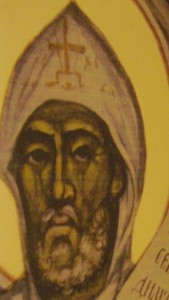The deities and religious thought of Egypt and Nubia also prepared the way for the Christian faith to come into Africa. The region’s polytheist faiths had high expectations that were to be embodied by the pharaohs and embraced by all. The sun god, Ra, was the source of all good things. A king was to act as the son of this god and establish ethical and moral principles, called Maat (a goddess of justice and truth), throughout the land. Wrongdoing was not to be tolerated and ancient text were to be read so that the pharaoh could follow the ways of Ra.

Horus was represented as a divine falcon. His main rival was Set, the deity of destruction and disorder. These forces were not inherently evil but could do man great harm unless they were under the control of truth, justice, and wisdom. In Nubia, Horus was the son of Ra and the star goddess, Nut. Devotees of Ra would appeal to his son as a mediator.
This role spilled over to his worship in Egypt as the son of Osiris, the god of fertility who also judged the dead. Osiris was murdered and cut into many pieces by Set. Isis, the goddess of love and destiny, was the wife of Osiris who gathered the pieces together and brought the god back to life. She was the mother of Horus and often pictured nursing him.

Despite having their own pantheon of deities, Greeks and Romans were attracted to worshiping Isis. Native Egyptians and Nubians were welcomed in Athens, Rome, and other European cities to teach the rituals and theology of her worship. Emperors permitted the worship of these gods and goddesses as long as believers didn’t stand against the cult of the emperor as a god. Horus was sometimes depicted in a Roman military helmet spearing a crocodile.
Ethical governance, belief in the afterlife and divine judgement, the power of love to heal and resurrect life; these things had universal appeal among Nile Valley Africans and the Mediterranean world. Bringing the forces of chaos and disorder under control was another universal desire of all people. The worship of these deities grew among the Nubians even as Christianity became legalized in the fourth century. The Christian Pharaoh Silko tolerated these ancient African faiths during his rule. But, the Byzantine missionaries had the pagan temples closed in the 6th century.

Combined with the native ideal of monotheism and the practice of Judaism in small communities, Africa was ripe for evangelism from the apostles and first generation of Christians. The Hebrew prophets Isaiah and Jeremiah foretold an end to Egypt’s idol worship as the Lord would be present in their land. According to the Gospel of Matthew, the Virgin Mary, Joseph, and the baby Jesus fled to Egypt hiding from King Herod. Whenever the mother and child came to a pagan temple, the idols fell down and smashed. The pagan priest found the written prophecies and created images honoring Mary and Jesus.
Sources:
The Orthodox Study Bible, Isaiah 19:1, Jeremiah 43:12, 13
St. Nicholai Velimirovich, Prologue of Orhid, Sebastian Press, Alhambra CA, 2017, Reflection December 27
Salim Faraji, The Roots of Nubian Christianity Uncovered, Africa World Press, Trenton NJ, 2012
Paisius Altschul, Wade in the River: The Story of the African Christian Faith, Crossbearers Publishing, Kansas City MO, 2001
Frank Snowden, Before Color Prejudice, Harvard U. Press, Cambridge MA & London1997
Frank Snowden, Blacks in Antiquity, Harvard U. Press, Cambridge MA, 1970
Goddesses, Heroes, and Shamans: The Young People’s Guide to World Mythology, Kingfisher Publishing, New York, 1994

Reblogged this on All Saints West Point.